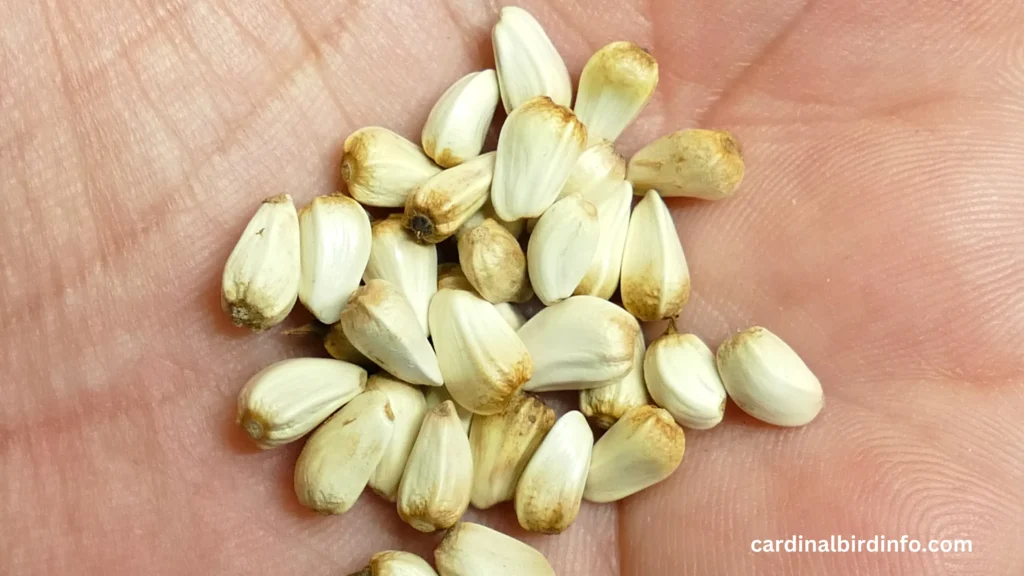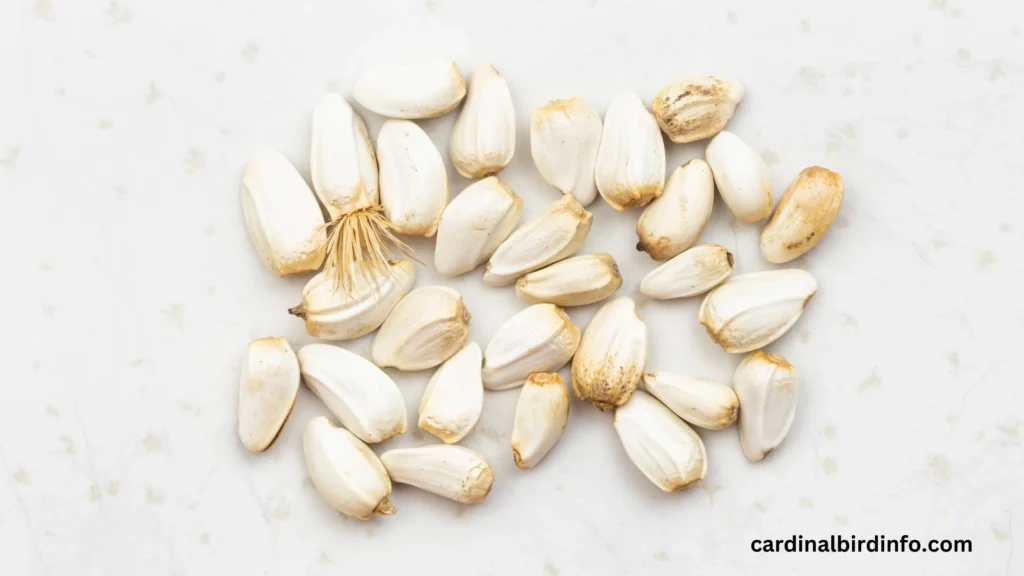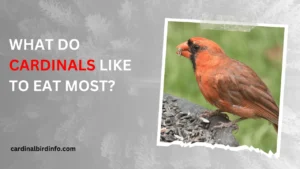It’s a question that sparks curiosity in both seasoned birdwatchers and casual nature lovers alike. Cardinals are known for their striking red feathers and vibrant presence in backyards across North America, but what truly captures their attention at the feeder?
Understanding the dietary preferences of these beautiful birds can turn your backyard into a cardinal haven. Cardinals are more than just a pop of color in your garden; they are essential players in maintaining the balance of local ecosystems.
Their feeding habits not only reflect their natural instincts but also guide us in choosing the right seeds to attract and nourish them. So, where do safflower seeds fit into this equation? Are they just another type of birdseed, or do they hold a special appeal for cardinals?
In this article, we’ll explore the nutritional benefits of safflower seeds, compare them to other popular bird seeds, and dive deep into scientific studies and real-life observations
. Whether you’re a bird enthusiast or just trying to find the best way to attract cardinals to your yard, understanding their preferences can make all the difference. Read on to discover if safflower seeds are the secret to keeping these feathered friends coming back for more.

Contents
- 1 Safflower Seeds: A Nutritional Analysis
- 2 Cardinals’ Feeding Habits and Preferences
- 3 Research and Studies
- 4 Pros and Cons of Safflower Seeds for Cardinals
- 5 Tips for Using Safflower Seeds to Attract Cardinals
- 6 Conclusion
- 7 FAQs
- 7.1 1. Do cardinals like safflower seeds?
- 7.2 2. Why should I use safflower seeds instead of other seeds?
- 7.3 3. Are safflower seeds better than sunflower seeds for cardinals?
- 7.4 4. Do other birds eat safflower seeds too?
- 7.5 5. Will safflower seeds attract squirrels?
- 7.6 6. How should I offer safflower seeds to cardinals?
Safflower Seeds: A Nutritional Analysis
Safflower seeds pack a punch when it comes to nutrition. They are rich in protein, fat, and fiber, providing a balanced diet that supports a bird’s health and energy levels. The high fat content is especially useful for cardinals during colder months when they need extra energy to stay warm.
Compared to black oil sunflower seeds, safflower seeds are slightly lower in overall fat but offer a higher concentration of protein. This makes them a great alternative for cardinals, who benefit from the variety in their diet. They also contain important vitamins that contribute to the birds’ overall health, including vitamin E, which supports their feathers and immune system.
Cardinals’ Feeding Habits and Preferences
In the wild, cardinals enjoy a diverse diet. They feed on insects, berries, and fruits, providing them with the necessary nutrients for survival. When it comes to seeds, cardinals are known to be somewhat particular, often favoring those that are easy to crack open and rich in nutrients.
Cardinals have been observed to enjoy seeds like black oil sunflower seeds and millet, but they are also drawn to safflower seeds due to their shape and size, which are easy for them to handle. Their preference for safflower seeds could be tied to their natural instinct to seek out foods that balance energy and nutrition.

Research and Studies
Although limited, some scientific studies and birdwatcher reports suggest that cardinals do enjoy safflower seeds. These seeds are not a common choice in many feeders, but those who have introduced them report seeing a steady increase in cardinal visits.
Observations also highlight that while cardinals may take time to adjust to a new seed type, they eventually embrace safflower seeds as part of their regular diet.
Pros and Cons of Safflower Seeds for Cardinals
One of the main benefits of safflower seeds is that they attract cardinals while often deterring less desirable birds, such as starlings and blackbirds. This makes safflower seeds an excellent choice if you’re aiming to attract a more selective bird population.
However, some critics argue that safflower seeds may not be as nutritious as sunflower seeds. While safflower seeds provide ample protein and fat, they may not offer the same energy boost needed during especially harsh weather conditions. Additionally, they can sometimes attract unwanted visitors like squirrels.
Tips for Using Safflower Seeds to Attract Cardinals
To make the most of safflower seeds, try using a platform feeder where cardinals can comfortably perch and feed. You can also scatter the seeds on the ground, as cardinals enjoy foraging at low heights. For the best results, offer a mix of safflower seeds with other favorites like sunflower seeds to give them variety.
Cardinals are most active in the early morning and late afternoon, so consider placing your feeder in a quiet, shaded area during these times to maximize visits. Providing a nearby water source can also enhance your chances of attracting these vibrant birds.
Conclusion
In summary, safflower seeds offer a nutritional alternative for cardinals and may help in attracting these stunning birds to your yard. While they may not be as widely used as other seeds, their benefits—like deterring unwanted birds and providing essential nutrients—make them worth considering.
Ultimately, the question of whether cardinals like safflower seeds can be answered with a resounding “yes,” though preferences may vary among individuals. If you’re looking to create a cardinal-friendly environment, introducing safflower seeds could be the next step toward achieving your goal.
FAQs
1. Do cardinals like safflower seeds?
Yes, cardinals generally enjoy safflower seeds. While they may not flock to them immediately if they’re used to other types of seeds, cardinals often develop a taste for safflower seeds over time. They appreciate the seed’s shape and size, which are easy for them to crack open.
2. Why should I use safflower seeds instead of other seeds?
Safflower seeds offer a unique advantage: they attract cardinals while deterring less desirable birds like starlings and grackles. Safflower seeds also contain important nutrients like protein, fat, and fiber, making them a nutritious option for birds.
3. Are safflower seeds better than sunflower seeds for cardinals?
Both seeds have their benefits. Sunflower seeds offer more fat, which is useful for energy, especially in winter. However, safflower seeds are a great alternative, especially if you’re trying to limit the number of unwanted bird species at your feeder.
4. Do other birds eat safflower seeds too?
Yes, other birds such as mourning doves, chickadees, and house finches also eat safflower seeds. However, many less desirable birds, like blackbirds and squirrels, tend to avoid them, making safflower seeds a selective option for your feeder.
5. Will safflower seeds attract squirrels?
One of the benefits of safflower seeds is that squirrels tend to dislike them due to their bitter taste. This makes safflower seeds an excellent choice if you’re looking to minimize squirrel activity around your feeder.
6. How should I offer safflower seeds to cardinals?
The best way to offer safflower seeds is through a platform feeder or a feeder with a wide perch, as cardinals prefer more stable feeding surfaces. You can also scatter seeds on the ground, as cardinals enjoy foraging.








